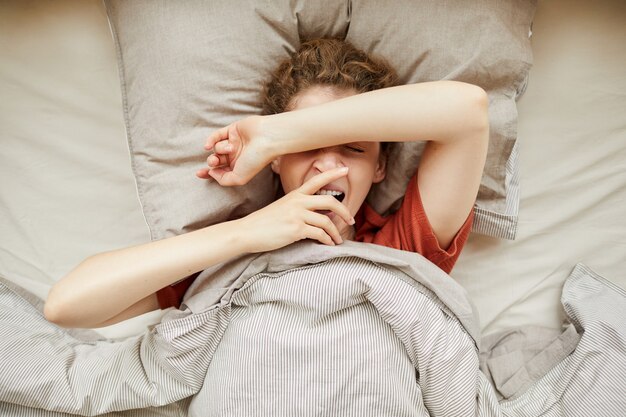Ask Ayurvedic doctor a question and get a consultation online on the problem of your concern in a free or paid mode. More than 2,000 experienced doctors work and wait for your questions on our site and help users to solve their health problems every day.
Ayurvedic Medicine for Sleep Apnea: Natural Relief for Restful Sleep

Introduction to Ayurvedic Medicine for Sleep Apnea
Sleep apnea is a serious sleep disorder that causes breathing interruptions during sleep, leading to poor sleep quality and a variety of health issues. While conventional treatments such as CPAP machines are commonly used, Ayurveda offers natural remedies that address the root causes of the condition. Ayurvedic medicine for sleep apnea focuses on balancing the body's doshas, enhancing respiratory function, and promoting better sleep through a holistic approach. By using a combination of herbal remedies, lifestyle changes, and therapies, Ayurveda can help manage sleep apnea and improve sleep quality naturally.
Don't wait or self medicate. Start chat with Doctor NOW
Historical Roots & Ayurvedic Significance
In Ayurveda, sleep disorders like sleep apnea are viewed as imbalances in the body's doshas—specifically Vata and Kapha. Vata dosha governs the movement of air and breath, and an imbalance can lead to irregular breathing patterns, while Kapha dosha, associated with heaviness and obstruction, can cause physical blockages in the airways. Ayurvedic texts mention several herbs and treatments that can restore doshic balance, improve respiratory health, and support deep, restorative sleep. The holistic Ayurvedic approach to treating sleep apnea includes not only herbal remedies but also breathing exercises, dietary adjustments, and specific treatments to enhance overall well-being.
Key Ayurvedic Remedies for Sleep Apnea
1. Ashwagandha (Withania somnifera)
Ashwagandha is a well-known adaptogenic herb in Ayurveda that helps regulate the nervous system and promote relaxation. It is commonly used to reduce stress, anxiety, and insomnia. Ashwagandha is also beneficial for balancing Vata dosha, which plays a role in sleep disorders. Regular consumption of ashwagandha can help promote restful sleep and improve breathing patterns during sleep, making it a useful herb in the management of sleep apnea.
2. Brahmi (Bacopa monnieri)
Brahmi is an herb that enhances mental clarity and relaxation. It is often used in Ayurvedic medicine for its calming effects on the mind, which is important for individuals with sleep apnea, as stress and anxiety can exacerbate the condition. Brahmi also strengthens the respiratory system and can be used to soothe the nervous system, promoting better sleep quality.
3. Jatamansi (Nardostachys jatamansi)
Jatamansi is a powerful herb used in Ayurveda to calm the mind and reduce the effects of stress and anxiety. Known for its sedative properties, Jatamansi promotes sound sleep and helps reduce the frequency of waking during the night, which is common in sleep apnea. Additionally, Jatamansi can enhance the quality of sleep and provide relief from breathing disturbances caused by airway obstructions.
4. Pippali (Piper longum)
Pippali, or long pepper, is traditionally used to improve digestion and respiratory health. It helps clear the lungs and airways, making it easier to breathe during sleep. Pippali's warming properties are beneficial for breaking down mucus and preventing airway blockages that contribute to sleep apnea. When combined with other herbs, Pippali can provide significant relief from breathing difficulties during sleep.
5. Shankhapushpi (Convolvulus pluricaulis)
Shankhapushpi is a popular herb in Ayurveda for its calming effects on the mind. It helps improve cognitive function and promotes restful sleep by reducing mental fatigue and anxiety. Shankhapushpi can be particularly beneficial for individuals with sleep apnea who experience difficulty falling asleep or staying asleep due to stress.
6. Guggulu (Commiphora mukul)
Guggulu is known for its anti-inflammatory and detoxifying properties. It can help reduce inflammation in the airways and improve respiratory function. By clearing the airways, Guggulu can ease the breathing process during sleep, making it beneficial for those suffering from sleep apnea. It also helps balance Kapha dosha, which is often linked to mucus accumulation and airway obstruction.
Ayurvedic Therapies for Sleep Apnea
1. Nasya Therapy
Nasya therapy involves the application of medicated oils or herbal preparations into the nostrils to clear blockages and promote better airflow. For sleep apnea, Nasya therapy can help open up the airways, reduce congestion, and improve respiratory function. Medicated oils such as Anu Taila are often used in Nasya to balance Vata and Kapha doshas, promoting clear breathing and restful sleep.
2. Pranayama (Breathing Exercises)
Pranayama, or controlled breathing exercises, is a core component of Ayurvedic practices that can help improve respiratory function and manage sleep apnea. Techniques such as Anulom Vilom (alternate nostril breathing) and Bhastrika (bellows breath) help strengthen the lungs, improve airflow, and calm the nervous system. Regular practice of pranayama can support healthy sleep patterns and reduce the frequency of breathing interruptions during the night.
3. Abhyanga (Oil Massage)
Abhyanga is an Ayurvedic oil massage that helps balance Vata dosha and promote relaxation. By using calming oils such as Sesame oil or Brahmi oil, Abhyanga helps relieve tension, reduce stress, and promote restful sleep. It also enhances circulation and can improve the functioning of the respiratory system, which is essential for those suffering from sleep apnea.
4. Shirodhara
Shirodhara is a therapeutic treatment in Ayurveda where warm oil is poured over the forehead, specifically targeting the third eye region. This treatment helps calm the mind, reduce stress, and promote deep relaxation. For individuals with sleep apnea, Shirodhara can be particularly beneficial in improving sleep quality and reducing anxiety that contributes to breathing irregularities during sleep.
Dietary Recommendations for Sleep Apnea
In addition to Ayurvedic remedies and therapies, dietary changes play a crucial role in managing sleep apnea. Certain foods can help promote better respiratory health and improve sleep quality:
- Warm, easily digestible foods such as soups, stews, and cooked vegetables can support digestion and prevent congestion in the airways.
- Herbal teas made with Ginger and Turmeric can help reduce inflammation and improve respiratory function.
- Avoid heavy, oily, and spicy foods before bedtime to prevent congestion and acid reflux, which can exacerbate sleep apnea symptoms.
- Incorporate foods rich in antioxidants, such as berries and leafy greens, to support overall respiratory health.
Conclusion
Ayurvedic medicine offers a holistic approach to managing sleep apnea by addressing its root causes and focusing on balancing the doshas, enhancing respiratory function, and promoting relaxation. With the use of powerful herbs like Ashwagandha, Brahmi, Jatamansi, and Pippali, combined with therapies such as Nasya, Pranayama, and Abhyanga, Ayurveda provides effective remedies for improving sleep quality and reducing the symptoms of sleep apnea. Consulting a certified Ayurvedic practitioner can help tailor these treatments to your specific needs and support long-term health and well-being.
Frequently Asked Questions for Ayurvedic Medicine for Sleep Apnea
What are the best Ayurvedic herbs for sleep apnea?
Several Ayurvedic herbs can help manage sleep apnea, including Ashwagandha, Brahmi, Jatamansi, Pippali, and Shankhapushpi. These herbs promote relaxation, improve respiratory health, reduce inflammation, and help balance the doshas, ultimately supporting better sleep.
How does Ashwagandha help with sleep apnea?
Ashwagandha is an adaptogenic herb known for its ability to reduce stress and anxiety, which are often linked to sleep disturbances. By calming the nervous system and regulating Vata dosha, Ashwagandha helps improve sleep quality and promotes restful breathing during sleep, making it useful in managing sleep apnea.
Can pranayama help manage sleep apnea?
Yes, pranayama (breathing exercises) is highly effective in managing sleep apnea. Techniques like Anulom Vilom(alternate nostril breathing) and Bhastrika (bellows breath) can strengthen the lungs, enhance airflow, and calm the nervous system, improving both breathing and sleep quality.
What is Nasya therapy and how does it work for sleep apnea?
Nasya therapy involves the application of medicated oils or herbal preparations into the nostrils to clear blockages and promote better airflow. For sleep apnea, Nasya helps open the airways, reduce congestion, and improve breathing during sleep, addressing common respiratory issues that cause sleep apnea.
Are there any dietary recommendations to help with sleep apnea?
Yes, a balanced diet is essential for managing sleep apnea. Avoid heavy, oily, and spicy foods before bedtime, as they can contribute to congestion and acid reflux. Incorporate easily digestible, warm foods, such as soups and stews, and herbal teas with Ginger and Turmeric to reduce inflammation and improve respiratory function.
How long does it take to see results from Ayurvedic treatment for sleep apnea?
Results can vary depending on individual health conditions, but with consistent use of Ayurvedic remedies and therapies, many individuals may begin to experience improvements in sleep quality and respiratory function within a few weeks. However, long-term use and lifestyle changes are key for managing sleep apnea effectively.
Can Ayurvedic treatments be used alongside conventional treatments for sleep apnea?
Yes, Ayurvedic treatments can be used in conjunction with conventional treatments for sleep apnea, such as CPAP machines or other medical interventions. However, it is important to consult with both an Ayurvedic practitioner and a healthcare provider to ensure safe and complementary care.
References & Further Reading
- Lad, V. (2002). Ayurveda: The Science of Self-Healing.
- Sharma, P.V. (1995). Ayurvedic Healing: A Comprehensive Guide.
- Vasant, K. (2008). Ayurvedic Medicine for Respiratory Health.
- Journal of Ayurveda and Integrative Medicine – Research articles on respiratory health and Ayurvedic treatments for sleep disorders.
- National Institute of Ayurveda: – Information on Ayurvedic therapies for various health conditions, including sleep apnea.



